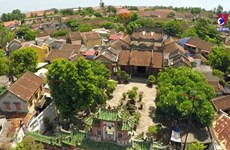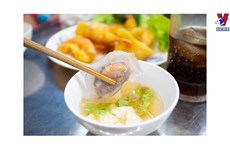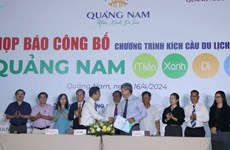Hotels furbish green credentials
Vietnam's hotel sector is showing encouraging signs of progress in
awareness and management of the environment as well as quality
standards, according to an annual report released by Grant Thornton
Vietnam on June 20.
Vietnam's hotel sector is showing encouraging signs of progress in
awareness and management of the environment as well as quality
standards, according to an annual report released by Grant Thornton
Vietnam on June 20.
The Vietnam Hotel Survey 2013, based on data related to three to five star hotels and resorts across Vietnam in the 2012 fiscal year, says over 82 percent of respondents have indicated they have an environmental plan in place.
Almost 65 percent of the hoteliers said they are taking strong measures to improve energy efficiency and reduce waste and pollution (more commonly in the north than the centre and south), Kenneth Atkinson, managing partner of Grant Thornton Vietnam, told the press.
Almost 52 percent of the respondents, especially 4- and 5-star hotels, have started providing training in the environmental aspects of hotel operations.
On the performance aspect, the report says that in 2012, the average occupancy rate and average room rates dipped lightly over 2011 to 60.2 percent and 90.40 USD respectively.
The study revealed that the ratio of food and beverage (F&B) revenues to the total increased by 1.1 percent over 2011 to 29.1 percent last year. Total revenues comprise room sales, food and beverage (F&B) sales and sales of other services (income from banquet, spa, conference and business centre and others).
In the same period, there was a decline of 0.6 percent in the ratio of room sales to total revenues to 62.1 percent.
The high-end hotel industry in Vietnam maintained the same EBITDA (earnings before interest, taxes, depreciation and amortisation) as a percentage to sales between 2011 and 2012, at an average of 28.2 percent, in spite of the different structures of some related costs.
The proportion of international and domestic guests in 2012 was similar in proportion to 2011, with a 0.2 percent difference attributed to an increase in international guests.
Last year international arrivals in Vietnam went up almost 14 percent to 6.8 million, surpassing initial forecasts by 0.3 million.
In 2012, Asians, including Vietnamese citizens, accounted for the highest number of hotel guests at 46.7 percent, an increase of 5.5 percent compared with the previous year.
Interestingly, 2012 also saw a significant reduction in the proportion of guests from Europe (down 5.6 percent) and a slight decrease of 0.5 percent from other regions.
Business travellers, individual tourists and tour groups are the three largest components of hotel guests over the last 10 years (2003 to 2012). Among these, business travellers significantly increased by 6.9 percent, while MICE visitors decreased by 2.7 percent in 2012 over the previous year.-VNA
The Vietnam Hotel Survey 2013, based on data related to three to five star hotels and resorts across Vietnam in the 2012 fiscal year, says over 82 percent of respondents have indicated they have an environmental plan in place.
Almost 65 percent of the hoteliers said they are taking strong measures to improve energy efficiency and reduce waste and pollution (more commonly in the north than the centre and south), Kenneth Atkinson, managing partner of Grant Thornton Vietnam, told the press.
Almost 52 percent of the respondents, especially 4- and 5-star hotels, have started providing training in the environmental aspects of hotel operations.
On the performance aspect, the report says that in 2012, the average occupancy rate and average room rates dipped lightly over 2011 to 60.2 percent and 90.40 USD respectively.
The study revealed that the ratio of food and beverage (F&B) revenues to the total increased by 1.1 percent over 2011 to 29.1 percent last year. Total revenues comprise room sales, food and beverage (F&B) sales and sales of other services (income from banquet, spa, conference and business centre and others).
In the same period, there was a decline of 0.6 percent in the ratio of room sales to total revenues to 62.1 percent.
The high-end hotel industry in Vietnam maintained the same EBITDA (earnings before interest, taxes, depreciation and amortisation) as a percentage to sales between 2011 and 2012, at an average of 28.2 percent, in spite of the different structures of some related costs.
The proportion of international and domestic guests in 2012 was similar in proportion to 2011, with a 0.2 percent difference attributed to an increase in international guests.
Last year international arrivals in Vietnam went up almost 14 percent to 6.8 million, surpassing initial forecasts by 0.3 million.
In 2012, Asians, including Vietnamese citizens, accounted for the highest number of hotel guests at 46.7 percent, an increase of 5.5 percent compared with the previous year.
Interestingly, 2012 also saw a significant reduction in the proportion of guests from Europe (down 5.6 percent) and a slight decrease of 0.5 percent from other regions.
Business travellers, individual tourists and tour groups are the three largest components of hotel guests over the last 10 years (2003 to 2012). Among these, business travellers significantly increased by 6.9 percent, while MICE visitors decreased by 2.7 percent in 2012 over the previous year.-VNA













